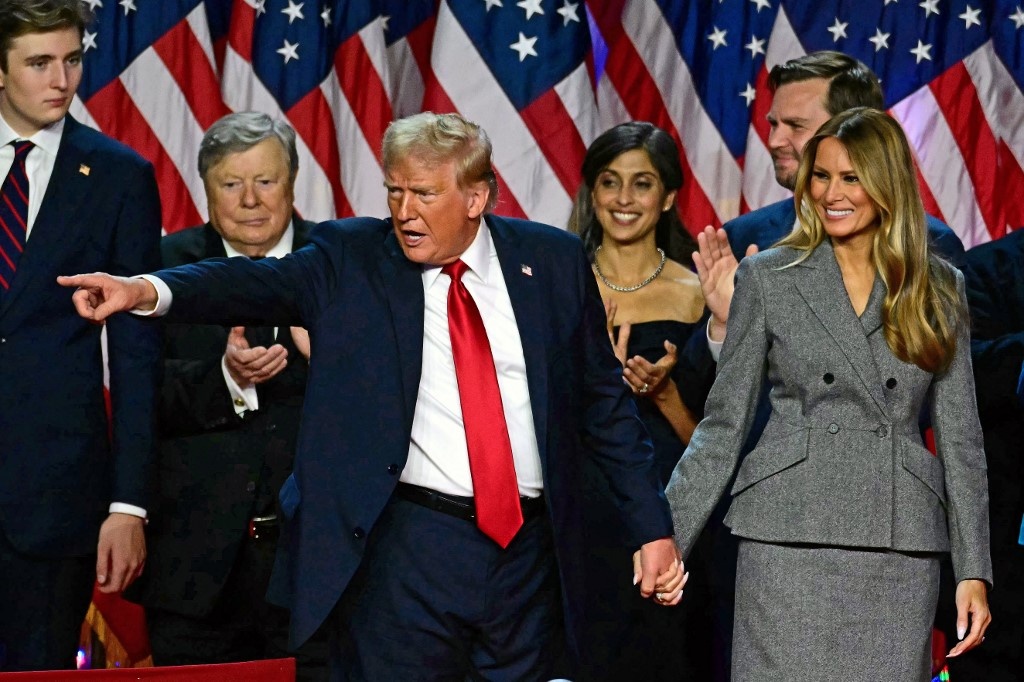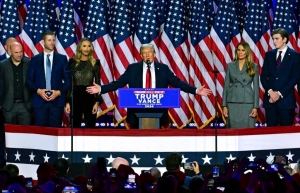US election result alters financial market outlook
The new White House administration, led by Donald Trump from next January, will likely commit to maintaining strict trade policies, including increased tariffs on Chinese goods, with potential extensions to other countries. Trump’s policy plan reportedly prioritises US manufacturing and energy production, proposing tariffs of 60 per cent on goods from China and 10-20 per cent on goods from other countries.
 |
| Former US President and Republican Presidential candidate Donald Trump gestures at supporters as he holds hands with former US First Lady Melania Trump during an election night event at the West Palm Beach Convention Center, in West Palm Beach, Florida, early on November 6, 2024. Republican former president Donald Trump closed in on a new term in the White House early November 6, 2024, just needing a handful of electoral votes to defeat Democratic Vice President Kamala Harris. Jim WATSON / AFP |
For Vietnam, an open economy where trade turnover makes up 158 per cent of GDP, the US is the largest export market with a trade surplus of $83 billion, while China remains the largest import partner with a trade deficit of $49 billion. The US election outcome is therefore poised to influence Vietnam’s trade dynamics.
According to a macroeconomic report by ACBS Research, published just before the US presidential election results were finalised, the VND may face heightened depreciation pressure if Trump’s economic policies are enacted, as they would strengthen the USD. This situation could constrain Vietnam’s monetary policy flexibility, adversely affecting the overall economy and particularly the profitability of the banking sector.
In the short term, Vietnamese exports to the US could face challenges if Trump enforces tariffs on all imports, as previously announced.
“Key export sectors such as seafood, tyres, and steel may face immediate hurdles due to the new tax policies, with potential long-term demand reduction if US import prices rise significantly. However, these challenges could be partly offset if Vietnamese firms capture market share from China,” stated the report.
The future US strategy to reduce reliance on Chinese goods appears to be a consistent policy across recent administrations, likely leading to continued foreign funding shifts from China to neighbouring countries. This trend is expected to drive Vietnam’s foreign direct investment growth, benefiting industrial real estate, transportation, and warehousing sectors as production capacity expands.
Dinh Duc Quang, head of Treasury and Global Markets at UOB Vietnam, anticipates minimal direct impact from the US election on VND interest rates due to Vietnam’s tightly regulated currency framework, which prioritises long-term trade and investment over short-term speculation.
“With regard to interest rates, regulatory bodies are unlikely to alter key policy rates, such as the refinancing rate, rediscount rate, and deposit rate cap. Instead, they may utilise commercial intervention rates, including Treasury bill and open market operation rates, to maintain short-term 3-month deposit rates around 3-4 per cent and 12-month rates at 5-6 per cent,” Quang added.
Frederic Neumann, chief economist for Asia at HSBC, commented that Vietnam’s economic fundamentals appear robust enough to manage such fluctuations.
“While Trump may place less emphasis on tariffs, he might adjust monetary policy. However, I believe Vietnam’s economy is resilient enough to handle exchange rate fluctuations of around 10-20 per cent. In addition, exchange rate pressures offer an upside: while exports may decelerate, domestic demand could increase,” he said.
In the stock market, the opening of the November 6 trading session was notably positive, with industrial real estate and export stocks rallying as the US election results approached. By the time of the announcement, the VN-Index had risen nearly 16 points with over 500 stocks in the green.
Significant gains were observed in industrial real estate stocks, including Becamex IDC Corp, up 2.43 per cent, and stocks hitting the ceiling, such as SONADEZI Chau Duc, Sai Gon VRG Investment Corporation, and Kinh Bac City Development Holding Corporation, all with increases of nearly 7 per cent.
“In the short term, market sentiment leans towards a Trump victory, indicating continued production shifts away from China. Given Vietnam’s high-level trade agreements with the US, this trend is likely to benefit these stocks in the near term,” said Nguyen Thanh Lam, director of Research and Analysis for Retail Clients at Maybank Securities.
An Agriseco Insight report on the Vietnamese stock market and the US election advises investors to consider sectors like industrial real estate, textiles, and wood products, which could be influenced by potential US policies.
“On one hand, increased import tariffs of 10-20 per cent on goods from all countries may reduce the competitiveness of Vietnamese products relative to US domestic goods. Additionally, enhanced origin investigations to prevent tax evasion could increase costs and impact business operations. Conversely, the gap left by tariffed Chinese goods presents opportunities for Vietnamese firms to increase exports to the US,” the report noted.
Nguyen The Minh, head of Research and Development for Retail Clients at Yuanta Securities Vietnam said, “Trump’s focus on fossil fuels suggests that sectors like oil and gas services would benefit. Although oil prices have remained low since late 2023, demand for them has limited oil consumption and prevented sharp price increases. However, this doesn’t imply a disregard for clean energy.”
 | Industrial real estate stocks benefit from US election results Industrial real estate stocks are forecast to benefit from a surge in factory relocations driven by increased FDI following Donald Trump's US election victory. |
 | Trump claims 'magnificent' victory over Harris Donald Trump claimed a "magnificent" victory over Kamala Harris in the fight for the presidency on Wednesday as results put him on the verge of one of the most stunning comebacks in US political history. |
 | Trump’s second term impacts sci-tech activities and industry 4.0 technologies RMIT's experts preview notable impacts that the second Trump administration might have on the digital and technological development and Industry 4.0 in Vietnam. |
What the stars mean:
★ Poor ★ ★ Promising ★★★ Good ★★★★ Very good ★★★★★ Exceptional
Related Contents
Latest News
More News
- Construction firms poised for growth on public investment and capital market support (February 11, 2026 | 11:38)
- Mitsubishi acquires Thuan An 1 residential development from PDR (February 09, 2026 | 08:00)
- Frasers Property and GELEX Infrastructure propose new joint venture (February 07, 2026 | 15:00)
- Sun Group led consortium selected as investor for new urban area (February 06, 2026 | 15:20)
- Vietnam breaks into Top 10 countries and regions for LEED outside the US (February 05, 2026 | 17:56)
- Fairmont opens first Vietnam property in Hanoi (February 04, 2026 | 16:09)
- Real estate investment trusts pivotal for long-term success (February 02, 2026 | 11:09)
- Dong Nai experiences shifting expectations and new industrial cycle (January 28, 2026 | 09:00)
- An Phat 5 Industrial Park targets ESG-driven investors in Hai Phong (January 26, 2026 | 08:30)
- Decree opens incentives for green urban development (January 24, 2026 | 11:18)

 Tag:
Tag:





















 Mobile Version
Mobile Version